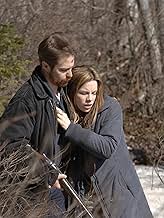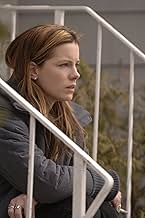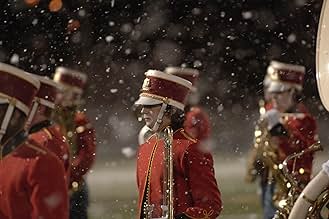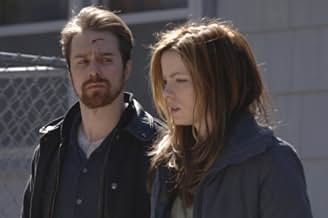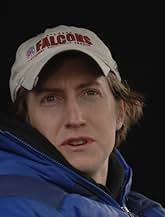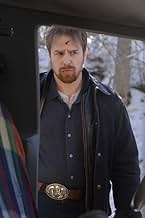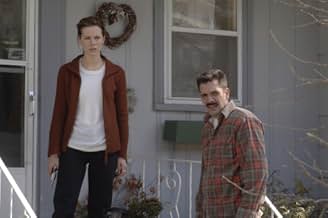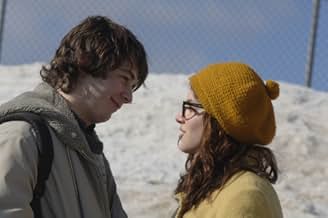CALIFICACIÓN DE IMDb
6.8/10
13 k
TU CALIFICACIÓN
Un drama que entrelaza la vida de un adolescente, con su antigua niñera, su marido separado y la hija de ambos.Un drama que entrelaza la vida de un adolescente, con su antigua niñera, su marido separado y la hija de ambos.Un drama que entrelaza la vida de un adolescente, con su antigua niñera, su marido separado y la hija de ambos.
- Dirección
- Guionistas
- Elenco
- Premios
- 1 premio ganado y 4 nominaciones en total
Gracie Hudson
- Tara Marchand
- (as Grace Hudson)
Slavko Negulic
- Oskar
- (as Slavico Negulic)
- Dirección
- Guionistas
- Todo el elenco y el equipo
- Producción, taquilla y más en IMDbPro
Opiniones destacadas
"Snow Angels" is a glimpse in time of several relationships, some simmering and ready to boil, others cooling down, and at least one whose flame has yet to be lit. It's also a thriller, with a gunshot that is heard as the film opens. The narrative is linear but writer/director David Gordon Green, adapting the novel by Stewart O'Nan, takes the couples' stories and interweaves them in such a way that we never quite know all the secrets at the heart of the mystery. The film flashes back as we try to see how we got from there to here. In many ways the overriding theme deals with the promise of what once was versus the reality of what could have been. The "reality" is embodied in the relationships which are falling apart, as evident in the older couples. The "promise" is represented by the young couple whose lives are just beginning.
At the heart of the film is the crumbling relationship between Sam Rockwell as Glenn and Kate Beckinsale as Annie. We watch Glenn almost literally disintegrating before our eyes as he tries to get a grip on who he is and why his marriage is failing. Glenn is one of the most frightening characters I've seen outside of horror films. Kate Beckinsale's Annie is breathtaking, in every sense of the word. We bear witness to a life in free fall as everything and everyone she loves seems just out of reach. You know those dreams where you can't quite get to where you want? You try to touch it but it stays at arm's length? That's Annie's world. We so painfully watch as the madness around her takes its toll, and she weathers the way rain erodes rich topsoil, leaving little but rocky dirt underneath. Amy Sedaris is Annie's best friend Barb. She has her own marital fires to put out, and the relationship between Annie and Barb progresses in a way nobody can imagine. She is a joy to watch. In the midst of the darkness there are some lighter moments as well, and Michael Angarano (Arthur Parkinson), Olivia Thirlby (Lila Raybern), and Connor Paolo (Warren) have the lion's share of them. They are essentially the light in the darkness that surrounds the rest of the film. It should be no surprise to fans of Angarano that writer/director David Gordon Green would have chosen him to play Arthur Parkinson. He's not yet comfortable in his own skin, a trait which could describe most adolescents. He's a bit shy, nervous, and even nerdy, yet he is charming enough that everyone else seems drawn to him even though he doesn't seem to be aware of it. As Arthur's muse, Olivia Thirlby's Lila is the female representation of those awkward teenage years and an almost equal counterpart to Michael's Arthur. Their tender tiptoeing around each other is one of the most touching depictions of first love I've seen in cinema. Connor, as Arthur's best friend Warren, provides some much needed comic relief. He is a smart-ass whose ego often backfires. He's funny and not quite as smart as he thinks he is. Among other standout performances is Griffin Dunne (Don) as Arthur's flighty dad. Or should we say father, not really the "Dad" that Arthur wants or needs him to be, but the boy clings to him in this critical time of life when he is most in need of a male role model. But he won't find one here. It's this failure to connect which climaxes in an exchange between them that gave me chills. It was a jaw-dropping moment.
So much of the film is frightening that, as Green said in the Q&A afterward, he had to find actors who could infuse some humor into their characters, otherwise it would be too heavy. All around me were glistening eyes and tissues wiping away tears. At its heart it is a sad story and the audience was hushed at the end. Many have wondered how much of the film is David Gordon Green's adaptation as opposed to the Stewart O'Nan novel on which it is based. Green did discuss this at length in the Q&A. After reading the book, he knew he had to make it into a film. But he also immediately knew that it would have to be heavily adapted. The more he wrote the more he realized just how much would really have to come from his own hand. The impression I got was that what we see on screen is much more David's work than maybe even he had initially anticipated.
Jeff McIlwain and David Wingo's score is haunting, as is the film. It is used sparsely, only to punctuate the dramatic moments, as the subject matter is weighty enough that it didn't need much augmentation. It's used efficiently and effectively. The film is visually stunning. No surprise here, as it was shot by Green's longtime collaborator Tim Orr. His work is unmistakable -- gutters dripping, swings on a swing set, clouds, contrails, aluminum siding -- you can always tell his work. He sees language in shapes and movement of inanimate objects. He then connects them to the action in the story, often with a wink and a nod. Blink and you might miss it. The beautiful winter landscape of Nova Scotia gives him a palette from which he can choose many colors. The juxtaposition of Orr's beautiful photography with the horrors David Gordon Green exposes us to in "Snow Angels" is nothing short of genius.
This is a true work of art, to which many filmmakers aspire. Few hit the mark. I'm not sure if that's what David Gordon Green was trying to do here, but he did it nonetheless. There is little doubt in my mind that this is a film which will make you think about the innocence of youth and how fleeting it is, and make you wonder if it has to be that way.
At the heart of the film is the crumbling relationship between Sam Rockwell as Glenn and Kate Beckinsale as Annie. We watch Glenn almost literally disintegrating before our eyes as he tries to get a grip on who he is and why his marriage is failing. Glenn is one of the most frightening characters I've seen outside of horror films. Kate Beckinsale's Annie is breathtaking, in every sense of the word. We bear witness to a life in free fall as everything and everyone she loves seems just out of reach. You know those dreams where you can't quite get to where you want? You try to touch it but it stays at arm's length? That's Annie's world. We so painfully watch as the madness around her takes its toll, and she weathers the way rain erodes rich topsoil, leaving little but rocky dirt underneath. Amy Sedaris is Annie's best friend Barb. She has her own marital fires to put out, and the relationship between Annie and Barb progresses in a way nobody can imagine. She is a joy to watch. In the midst of the darkness there are some lighter moments as well, and Michael Angarano (Arthur Parkinson), Olivia Thirlby (Lila Raybern), and Connor Paolo (Warren) have the lion's share of them. They are essentially the light in the darkness that surrounds the rest of the film. It should be no surprise to fans of Angarano that writer/director David Gordon Green would have chosen him to play Arthur Parkinson. He's not yet comfortable in his own skin, a trait which could describe most adolescents. He's a bit shy, nervous, and even nerdy, yet he is charming enough that everyone else seems drawn to him even though he doesn't seem to be aware of it. As Arthur's muse, Olivia Thirlby's Lila is the female representation of those awkward teenage years and an almost equal counterpart to Michael's Arthur. Their tender tiptoeing around each other is one of the most touching depictions of first love I've seen in cinema. Connor, as Arthur's best friend Warren, provides some much needed comic relief. He is a smart-ass whose ego often backfires. He's funny and not quite as smart as he thinks he is. Among other standout performances is Griffin Dunne (Don) as Arthur's flighty dad. Or should we say father, not really the "Dad" that Arthur wants or needs him to be, but the boy clings to him in this critical time of life when he is most in need of a male role model. But he won't find one here. It's this failure to connect which climaxes in an exchange between them that gave me chills. It was a jaw-dropping moment.
So much of the film is frightening that, as Green said in the Q&A afterward, he had to find actors who could infuse some humor into their characters, otherwise it would be too heavy. All around me were glistening eyes and tissues wiping away tears. At its heart it is a sad story and the audience was hushed at the end. Many have wondered how much of the film is David Gordon Green's adaptation as opposed to the Stewart O'Nan novel on which it is based. Green did discuss this at length in the Q&A. After reading the book, he knew he had to make it into a film. But he also immediately knew that it would have to be heavily adapted. The more he wrote the more he realized just how much would really have to come from his own hand. The impression I got was that what we see on screen is much more David's work than maybe even he had initially anticipated.
Jeff McIlwain and David Wingo's score is haunting, as is the film. It is used sparsely, only to punctuate the dramatic moments, as the subject matter is weighty enough that it didn't need much augmentation. It's used efficiently and effectively. The film is visually stunning. No surprise here, as it was shot by Green's longtime collaborator Tim Orr. His work is unmistakable -- gutters dripping, swings on a swing set, clouds, contrails, aluminum siding -- you can always tell his work. He sees language in shapes and movement of inanimate objects. He then connects them to the action in the story, often with a wink and a nod. Blink and you might miss it. The beautiful winter landscape of Nova Scotia gives him a palette from which he can choose many colors. The juxtaposition of Orr's beautiful photography with the horrors David Gordon Green exposes us to in "Snow Angels" is nothing short of genius.
This is a true work of art, to which many filmmakers aspire. Few hit the mark. I'm not sure if that's what David Gordon Green was trying to do here, but he did it nonetheless. There is little doubt in my mind that this is a film which will make you think about the innocence of youth and how fleeting it is, and make you wonder if it has to be that way.
David Gordon Green is the most talented and consistently excellent American director to emerge this decade, making a splash he has yet to equal with "George Washington" in 2000, and gaining further recognition with the acclaimed, painfully true-to-life relationship drama "All the Real Girls". Sadly, his follow-up to "All the Real Girls", the outstanding "Undertow" failed to register with critics, and "Snow Angels", although better received, came and went without causing much buzz. Green's first major studio job, stoner action-comedy "Pineapple Express" was a big hit, and taken along with his unrelentingly grim "Snow Angels" shows the director attempting to move past his small-scale independent films which initially garnered so much acclaim for him.
"Snow Angels" is another drama from David Gordon Green, true, but it is also still different from his other films in the sense that it is his most tragic film and also his most narratively-focused (his previous films were far more lyrical). Here he's also dealing with sorts of characters he only touched on previously, and it's also (if you don't count his collaborative effort on "Undertow") his first screenplay adapted from another person's work. I have not read the novel "Snow Angels", but I doubt there is any detail, no matter how painful, which Gordon Green didn't unflinchingly transfer to the screen.
Although I enjoyed "All the Real Girls" a lot, I found that whenever the film was not focusing on the two leads it lost its edge and became a rather mundane, typical sort of film, with few truly interesting characters aside from the main two. "Snow Angels", perhaps partially due to it being an adaptation, doesn't fail to create interesting (although certainly not sympathetic) characters out of every last major player in this film. The story connects a teenager who is falling in love, his former babysitter, her estranged husband, and their daughter in an involving, focused narrative which is never exactly unpredictable but is always absorbing and deeply, deeply affecting. It's not an enjoyable film, exactly (at least the final hour isn't), but it is hypnotic, it is stunningly, stunningly well-directed and photographed by David Gordon Green and frequent collaborator Tim Orr, respectively (there are certain shots which are too beautiful to put into words), and I was absolutely transfixed for the entirety of this film.
Another film in what Nathan Lee (formerly) of the Village Voice terms the 'familiar turf of the Small-Town Midwinter Tragedy', which Lee insists the film transcends, "Snow Angels" is right up there with "The Sweet Hereafter" and Paul Schrader's "Affliction" (I was even surprised to find that Russell Banks wasn't the author of the novel this was based on), and for my money better than those two films. I quite like the Small-Town Midwinter Tragedy as a sub-genre, so I'm not going to say that this doesn't fall under that label, but I will say that "Snow Angels" achieves a sort of real, honest drama that can only come through true insight into the characters (in an interview with the Onion A.V. Club Gordon Green stated that this was a very personal project, and it shows), and a real understanding of them. In that sense it goes far beyond most tragedies (the vast majority are shallow, miserable, soulless tearjerkers, no matter how far back in history you look), and although it's unpleasantly dark and grim, there is humanity to the film, mostly observed through the young couple in love (these scenes are somewhat reminiscent of "All the Real Girls", only without the complications), which really elevates this beyond your typical downbeat film, as ultimately devastating and depressing as it is.
The film would be nothing without the performances, and as someone who couldn't have cared less for Kate Beckinsale before seeing this, I now think this was easily the best female performance of the year so far. If the Academy didn't require extensive lobbying for a film to get a nomination, Beckinsale would almost certainly be up for Best Actress come early 2009. The rest of the cast are excellent too, in particular Sam Rockwell, who may annoy a lot of viewers with his performance in this film, but it is absolutely necessary for the character to work, and is eerily reminiscent of someone I used to know, and all the more effective for it.
I don't want to see this film again for a long, long time, and in this case that's a good thing.
9/10
"Snow Angels" is another drama from David Gordon Green, true, but it is also still different from his other films in the sense that it is his most tragic film and also his most narratively-focused (his previous films were far more lyrical). Here he's also dealing with sorts of characters he only touched on previously, and it's also (if you don't count his collaborative effort on "Undertow") his first screenplay adapted from another person's work. I have not read the novel "Snow Angels", but I doubt there is any detail, no matter how painful, which Gordon Green didn't unflinchingly transfer to the screen.
Although I enjoyed "All the Real Girls" a lot, I found that whenever the film was not focusing on the two leads it lost its edge and became a rather mundane, typical sort of film, with few truly interesting characters aside from the main two. "Snow Angels", perhaps partially due to it being an adaptation, doesn't fail to create interesting (although certainly not sympathetic) characters out of every last major player in this film. The story connects a teenager who is falling in love, his former babysitter, her estranged husband, and their daughter in an involving, focused narrative which is never exactly unpredictable but is always absorbing and deeply, deeply affecting. It's not an enjoyable film, exactly (at least the final hour isn't), but it is hypnotic, it is stunningly, stunningly well-directed and photographed by David Gordon Green and frequent collaborator Tim Orr, respectively (there are certain shots which are too beautiful to put into words), and I was absolutely transfixed for the entirety of this film.
Another film in what Nathan Lee (formerly) of the Village Voice terms the 'familiar turf of the Small-Town Midwinter Tragedy', which Lee insists the film transcends, "Snow Angels" is right up there with "The Sweet Hereafter" and Paul Schrader's "Affliction" (I was even surprised to find that Russell Banks wasn't the author of the novel this was based on), and for my money better than those two films. I quite like the Small-Town Midwinter Tragedy as a sub-genre, so I'm not going to say that this doesn't fall under that label, but I will say that "Snow Angels" achieves a sort of real, honest drama that can only come through true insight into the characters (in an interview with the Onion A.V. Club Gordon Green stated that this was a very personal project, and it shows), and a real understanding of them. In that sense it goes far beyond most tragedies (the vast majority are shallow, miserable, soulless tearjerkers, no matter how far back in history you look), and although it's unpleasantly dark and grim, there is humanity to the film, mostly observed through the young couple in love (these scenes are somewhat reminiscent of "All the Real Girls", only without the complications), which really elevates this beyond your typical downbeat film, as ultimately devastating and depressing as it is.
The film would be nothing without the performances, and as someone who couldn't have cared less for Kate Beckinsale before seeing this, I now think this was easily the best female performance of the year so far. If the Academy didn't require extensive lobbying for a film to get a nomination, Beckinsale would almost certainly be up for Best Actress come early 2009. The rest of the cast are excellent too, in particular Sam Rockwell, who may annoy a lot of viewers with his performance in this film, but it is absolutely necessary for the character to work, and is eerily reminiscent of someone I used to know, and all the more effective for it.
I don't want to see this film again for a long, long time, and in this case that's a good thing.
9/10
Snow Angels is set in a small town in America during a non-specific time. There are few details that define or accentuate time and place. It could be any small town, USA, and for all we know, it could be the present. All we really know is that it is cold and wintertime. Directed by David Gordon Green, Snow Angels is a somber, affecting meditation on sadness and fate, based on the novel written by Stewart O'Nan. It chronicles two weeks in the life of the central characters, whose lives are all connected in some way.
The movie begins with striking images of winter, barren trees and snow. A high school marching band is rehearsing outdoors for the football game. They are lethargic and out of tune. Their instructor chides them, and we here the sound of what might be gunshots in the distance. Everything stops and the story goes back to two weeks prior, where the characters are introduced. We see Arthur (Michael Angarano) the high school student busing tables in a Chinese restaurant. He works with his older friend Annie, played by Kate Beckinsale, the newly separated mother who used to baby-sit for Michael when he was young. Annie gives Arthur a ride home when his mother forgets to pick him up. Arthur's parents, played by Jeanette Arnette and Griffin Dunne, are also going through a separation.
Later we meet Annie's estranged husband Glen, played by Sam Rockwell. Early on we learn that he has had problems with drinking and keeping a job and even tried to take his own life as a result of his life apart from Annie and the baby. Somehow, he survived the suicide and has become a born again Christian, but his stability remains uncertain. We also meet the new student Lila, played by Olivia Thirlby, who befriends Arthur. Lila is the outsider who takes photographs as a hobby. She is on the outside literally peering in, like the audience. Early on, she shows Arthur her photographs of the town. Since her family moves around a lot, she likes to take pictures of her first impressions of the new places she moves to. They are beautiful portraits, all black and white, mostly of them empty landscapes and snow. Coldness and alienation is a constant theme that wraps around the characters to a nearly suffocating extent.
Green's direction is deliberate and slowly paced. The camera rests patiently upon the characters, giving them time to grow and breathe. Even in awkward moments, as there are in the life of a teenager, and in the tension rising moments of the adults who are enduring emotional pain, the shots are long and deliberate, with a quiet, gentle soundtrack that does not try to manipulate or force the action. Green allows the dialog and the performances of the actors drive the story. There is no melodrama, just painfully sad realities.
Snow Angels has the feel of an independent film in its simple story-telling and without bloated production values or faux sentimentality or gimmicky performances. It feels like real life, real people in a real town. The only problem is that it's real, real sad. In fact, it's too sad. Despite the artful direction and nuanced performances, the film itself has little balance, nothing to contrast the heavy weight of angst that smothers the characters as well as the audience. Fargo, (1996), was a similar movie a tragic tale of human failings, set in a vast, winter of emptiness. And yet, there were many contrasting elements which balanced the mood, such as hilarious dialog and mannerisms, a riveting, driving musical score and shocking, unexpected violence. Many aspects of that film were recognized for achievement in film-making and I believe it even received Best Picture at the Academy Awards. I would also dare say that this movie energized the careers of several of its little known actors and deservedly so, including Steve Buscemi, William H. Macy and Frances McDormand. But Snow Angels provides no such relief from its oppressive tone. I get the feeling that Sam Rockwell and Kate Beckinsale needed an immediate retreat to a warm, tropic island after making this picture, (or at least a few sessions of therapy), and through no fault of their own. Their performances are great, but the movie, over all, leaves you with the need for immediate cleansing or escape, to anywhere that's warm.
The movie begins with striking images of winter, barren trees and snow. A high school marching band is rehearsing outdoors for the football game. They are lethargic and out of tune. Their instructor chides them, and we here the sound of what might be gunshots in the distance. Everything stops and the story goes back to two weeks prior, where the characters are introduced. We see Arthur (Michael Angarano) the high school student busing tables in a Chinese restaurant. He works with his older friend Annie, played by Kate Beckinsale, the newly separated mother who used to baby-sit for Michael when he was young. Annie gives Arthur a ride home when his mother forgets to pick him up. Arthur's parents, played by Jeanette Arnette and Griffin Dunne, are also going through a separation.
Later we meet Annie's estranged husband Glen, played by Sam Rockwell. Early on we learn that he has had problems with drinking and keeping a job and even tried to take his own life as a result of his life apart from Annie and the baby. Somehow, he survived the suicide and has become a born again Christian, but his stability remains uncertain. We also meet the new student Lila, played by Olivia Thirlby, who befriends Arthur. Lila is the outsider who takes photographs as a hobby. She is on the outside literally peering in, like the audience. Early on, she shows Arthur her photographs of the town. Since her family moves around a lot, she likes to take pictures of her first impressions of the new places she moves to. They are beautiful portraits, all black and white, mostly of them empty landscapes and snow. Coldness and alienation is a constant theme that wraps around the characters to a nearly suffocating extent.
Green's direction is deliberate and slowly paced. The camera rests patiently upon the characters, giving them time to grow and breathe. Even in awkward moments, as there are in the life of a teenager, and in the tension rising moments of the adults who are enduring emotional pain, the shots are long and deliberate, with a quiet, gentle soundtrack that does not try to manipulate or force the action. Green allows the dialog and the performances of the actors drive the story. There is no melodrama, just painfully sad realities.
Snow Angels has the feel of an independent film in its simple story-telling and without bloated production values or faux sentimentality or gimmicky performances. It feels like real life, real people in a real town. The only problem is that it's real, real sad. In fact, it's too sad. Despite the artful direction and nuanced performances, the film itself has little balance, nothing to contrast the heavy weight of angst that smothers the characters as well as the audience. Fargo, (1996), was a similar movie a tragic tale of human failings, set in a vast, winter of emptiness. And yet, there were many contrasting elements which balanced the mood, such as hilarious dialog and mannerisms, a riveting, driving musical score and shocking, unexpected violence. Many aspects of that film were recognized for achievement in film-making and I believe it even received Best Picture at the Academy Awards. I would also dare say that this movie energized the careers of several of its little known actors and deservedly so, including Steve Buscemi, William H. Macy and Frances McDormand. But Snow Angels provides no such relief from its oppressive tone. I get the feeling that Sam Rockwell and Kate Beckinsale needed an immediate retreat to a warm, tropic island after making this picture, (or at least a few sessions of therapy), and through no fault of their own. Their performances are great, but the movie, over all, leaves you with the need for immediate cleansing or escape, to anywhere that's warm.
10KateB819
'Snow Angels' is a movie based on a book by Stewart O'Nan. It is directed by David Gordon Green, and stars Sam Rockwell, Kate Beckinsale, and Michael Angarano. Rockwell and Beckinsale portray a recently divorced couple with a daughter, who were high school sweethearts. Angarano plays a teenager, who used to be baby-sat by Annie (Beckinsale). The movie follows the lives of several people, including Annie and Glenn (Rockwell), Arthur (Angrano) and his parents, and others as some relationships are built and others are destroyed.
The movie has a strong real-life feeling to it, thanks to great writing by Green and great acting skills by the cast. There are scenes where Annie yells at her child that may seem to be out of place at first glance, but are actually amazing true-to-life ways to express how sometimes parents can lose their tempers with their children. The scenes show how sometimes kids can try to push their parents' buttons, or play their parents against each other without even knowing it.
The acting is absolutely wonderful the actors show a wide range, from joy to sorrow, and from humor to violent anger. There are times when you love and sympathize with the characters, and there are times when you hate them so much your blood boils that's how strongly the audience connects to the characters. By the end of the movie, you feel drained, as if you just watched someone you love die.
There were times when the whole audience laughed together, and there were times when the whole audience grew silent in discomfort. The way that this movie consists of laugh-out-loud moments and moments when you just want to tear your heart out and break out a box of tissues is what makes it an outstanding movie. This movie doesn't even have to try to get its audience to love it. The script is chock-full of wit, life at its best and worst, and humor for every generation. The movie left me walking out of the BAM theater smiling and wishing I could watch it again, not wondering why I'd wasted over 10 bucks on a ticket.
The only problem I found with the movie was that its setting was a bit confusing. There were scenes where the characters used cell phones, and others where there were those record players for LPs. But other than that, the movie was flawless.
Beckinsale is at her best here, not only in looks, but in acting range. She took me on another world as I sympathized with her, felt angry at her, felt happy with her, and watched her as her character's story unfolded before my very eyes. This is one of her best movies, and to me it IS her best movie.
10/10, for sure.
The movie has a strong real-life feeling to it, thanks to great writing by Green and great acting skills by the cast. There are scenes where Annie yells at her child that may seem to be out of place at first glance, but are actually amazing true-to-life ways to express how sometimes parents can lose their tempers with their children. The scenes show how sometimes kids can try to push their parents' buttons, or play their parents against each other without even knowing it.
The acting is absolutely wonderful the actors show a wide range, from joy to sorrow, and from humor to violent anger. There are times when you love and sympathize with the characters, and there are times when you hate them so much your blood boils that's how strongly the audience connects to the characters. By the end of the movie, you feel drained, as if you just watched someone you love die.
There were times when the whole audience laughed together, and there were times when the whole audience grew silent in discomfort. The way that this movie consists of laugh-out-loud moments and moments when you just want to tear your heart out and break out a box of tissues is what makes it an outstanding movie. This movie doesn't even have to try to get its audience to love it. The script is chock-full of wit, life at its best and worst, and humor for every generation. The movie left me walking out of the BAM theater smiling and wishing I could watch it again, not wondering why I'd wasted over 10 bucks on a ticket.
The only problem I found with the movie was that its setting was a bit confusing. There were scenes where the characters used cell phones, and others where there were those record players for LPs. But other than that, the movie was flawless.
Beckinsale is at her best here, not only in looks, but in acting range. She took me on another world as I sympathized with her, felt angry at her, felt happy with her, and watched her as her character's story unfolded before my very eyes. This is one of her best movies, and to me it IS her best movie.
10/10, for sure.
"Snow Angels" starts off as a fairly conventional, angst-ridden indie drama about life in an American small town, but the movie turns into a profoundly moving work after an unexpected tragedy strikes the community.
Director David Gordon Green's screenplay (co-written by Stewart O'Nan) focuses on two disintegrating marriages - one belonging to Annie and Glen Marchand, and the other to Louise and Arthur Parkinson - and the effect the breakups are having on the children and extended families. The people in both groups already seem profoundly unhappy with their lives, but when an unspeakable disaster occurs, things go from bad to worse for all concerned.
"Snow Angels" features insightful writing, sensitive direction and a profound sense of place and season (it takes place in the deep, dark days of a Midwestern winter, though the film itself was filmed in Nova Scotia). It's not an easy movie to watch at times - its emotions wrenching and its characters' weaknesses all too human and recognizable – but excellent performances by Kate Beckinsale, Sam Rockwell, Michael Angarano, Jeanetta Arnette, Deborah Allen and Griffin Dunne, among others, make it worthwhile viewing.
Director David Gordon Green's screenplay (co-written by Stewart O'Nan) focuses on two disintegrating marriages - one belonging to Annie and Glen Marchand, and the other to Louise and Arthur Parkinson - and the effect the breakups are having on the children and extended families. The people in both groups already seem profoundly unhappy with their lives, but when an unspeakable disaster occurs, things go from bad to worse for all concerned.
"Snow Angels" features insightful writing, sensitive direction and a profound sense of place and season (it takes place in the deep, dark days of a Midwestern winter, though the film itself was filmed in Nova Scotia). It's not an easy movie to watch at times - its emotions wrenching and its characters' weaknesses all too human and recognizable – but excellent performances by Kate Beckinsale, Sam Rockwell, Michael Angarano, Jeanetta Arnette, Deborah Allen and Griffin Dunne, among others, make it worthwhile viewing.
¿Sabías que…?
- TriviaSam Rockwell really did hit his head on the truck, and punch the tree. (reference an interview at vimeo.com/859232) Previously he had gotten tips from a stunt man on how to head-bang the truck without hurting himself too much. However, when he hit the tree with his knuckles, he did it for real, and hard. He visited the hospital in the evening.
- ErroresIn the scene where Arthur takes a swig from a bottle of beer hidden on the floor, he raises it with the label facing him. In the next cut scene, as he lowers the bottle, the label can be clearly seen facing the camera.
- Citas
Louise Parkinson: You never know what fate has in store for you, sweetheart. It's funny how you can tell the fake smiles in pictures.
Arthur Parkinson: You notice people don't bring out cameras on sad days?
- Bandas sonorasSledgehammer
Written by Peter Gabriel
Published by Real World Music, Ltd. (PRS) for the World / Pentagon Lipservices Real World (BMI) Admin for USA & Canada
Courtesy of Real World Music, Ltd. and Lipservices Music Publishing
Performed by Atlantic Region Cadet Tri-Service Band
Selecciones populares
Inicia sesión para calificar y agrega a la lista de videos para obtener recomendaciones personalizadas
Detalles
- Fecha de lanzamiento
- País de origen
- Sitio oficial
- Idioma
- También se conoce como
- Снігові ангели
- Locaciones de filmación
- Productoras
- Ver más créditos de la compañía en IMDbPro
Taquilla
- Total en EE. UU. y Canadá
- USD 402,858
- Fin de semana de estreno en EE. UU. y Canadá
- USD 14,247
- 9 mar 2008
- Total a nivel mundial
- USD 414,404
- Tiempo de ejecución1 hora 47 minutos
- Color
- Mezcla de sonido
- Relación de aspecto
- 2.35 : 1
Contribuir a esta página
Sugiere una edición o agrega el contenido que falta

Principales brechas de datos
What is the Spanish language plot outline for Snow Angels (2007)?
Responda






